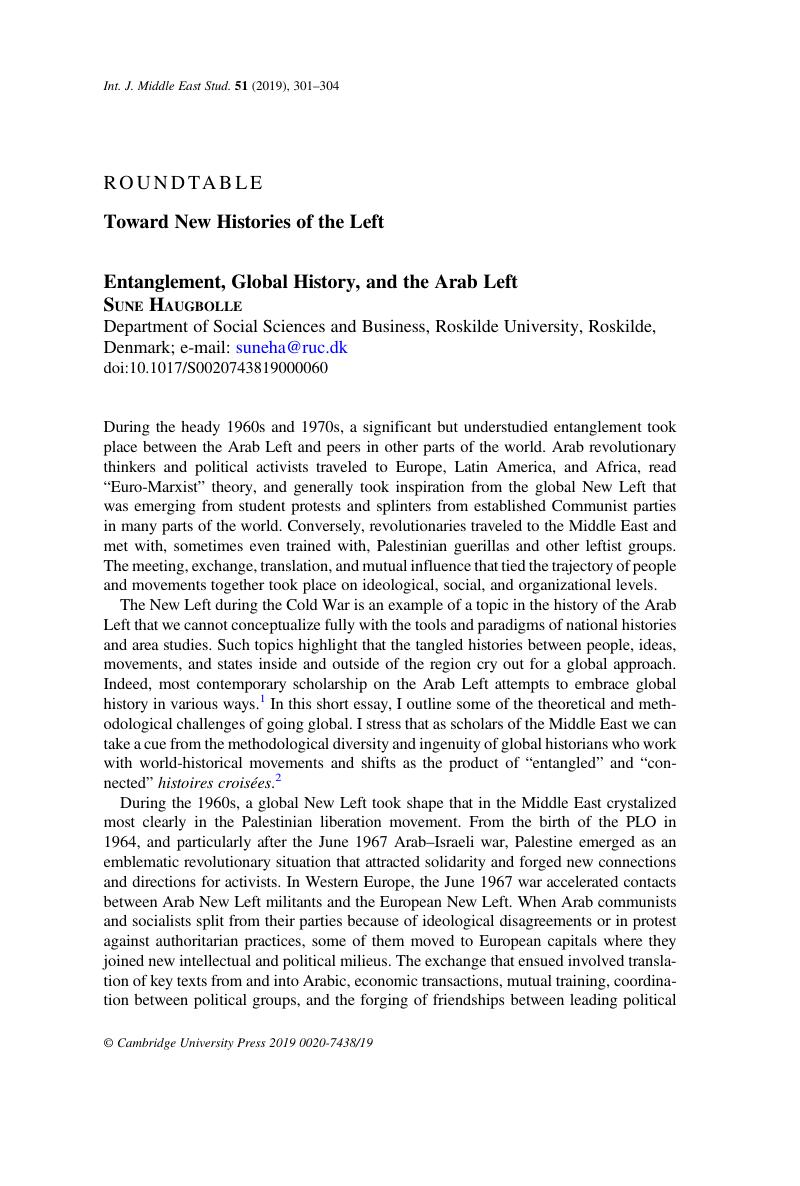Article contents
Entanglement, Global History, and the Arab Left
Published online by Cambridge University Press: 10 May 2019
Abstract

- Type
- Roundtable
- Information
- Copyright
- Copyright © Cambridge University Press 2019
References
NOTES
1 See, e.g., Holt, Elizabeth M., “‘Bread or Freedom’: The Congress for Cultural Freedom, the CIA, and the Arabic Literary Journal Ḥiwār (1962–67),” Journal of Arabic Literature 44 (2013): 83–102CrossRefGoogle Scholar.
2 Subrahmanyam, Sanjay, “Connected Histories: Notes Towards a Reconfiguration of Early Modern Eurasia,” Modern Asian Studies 31 (1997): 735–62CrossRefGoogle Scholar; Lepenies, Wolf, ed., Entangled Histories and Negotiated Universals: Centers and Peripheries in a Changing World (Frankfurt: Campus Verlag, 2003)Google Scholar; Werner, Michael and Zimmermann, Bénédict, eds., De la comparaison à l'histoire croisée (Paris: Seuil, 2004)Google Scholar.
3 Burne, Jeffrey James, Mecca of the Revolution: Algeria, Decolonization, and the Third World Order (Oxford: Oxford University Press, 2016)CrossRefGoogle Scholar.
4 Chamberlin, Paul Thomas, The Global Offensive: The United States, the PLO, and the Making of a Post–Cold War Order (Oxford: Oxford University Press, 2012)Google Scholar.
5 Keucheyan, Razmig, The Left Hemisphere: Mapping Critical Theory Today (London: Verso, 2016)Google Scholar.
6 See special issue of the online journal Muftah, “Syria and the Left,” 5 November 2016, accessed 29 December 2018, https://muftah.org/special-collection-syria-left/.
7 I use problem space in the sense promoted by postcolonial theorist David Scott as the complex of statements, propositions, resolutions and arguments offered in answer to largely implicit questions in a particular time and space. “David Scott by Stuart Hall,” conversation in BOMB magazine 90, 5 January 2005, accessed 29 December 2018.
8 Rodinson, Maxime, Marxisme et monde musulman (Paris: Seuil, 1972)Google Scholar.
9 Sing, Manfred, “Arab Self-Criticism after 1967 Revisited: The Normative Turn in Marxist Thought and Its Heuristic Fallacies,” Arab Studies Journal 25 (2017): 144–90Google Scholar.
10 For an overview of recent scholarship on the Arab Left, see Hagbolle, Sune and Sing, Manfred, “New Approaches to Arab Left Histories,” Arab Studies Journal 24 (2016): 90–97Google Scholar.
11 See Miriyam Aouragh's contribution to this roundtable.
12 Meriggi, Marco, “Global History: Structures, Strategies, Open Problems,” Annals of the Fondazione Luigi Einaudi: An Interdisciplinary Journal of Economics, History and Political Science 52 (2018): 35–44Google Scholar.
13 Said, Edward, “Travelling Theory,” in The World, the Text, and the Critic (Cambridge: Cambridge University Press, 1983), 226–47Google Scholar.
- 2
- Cited by


